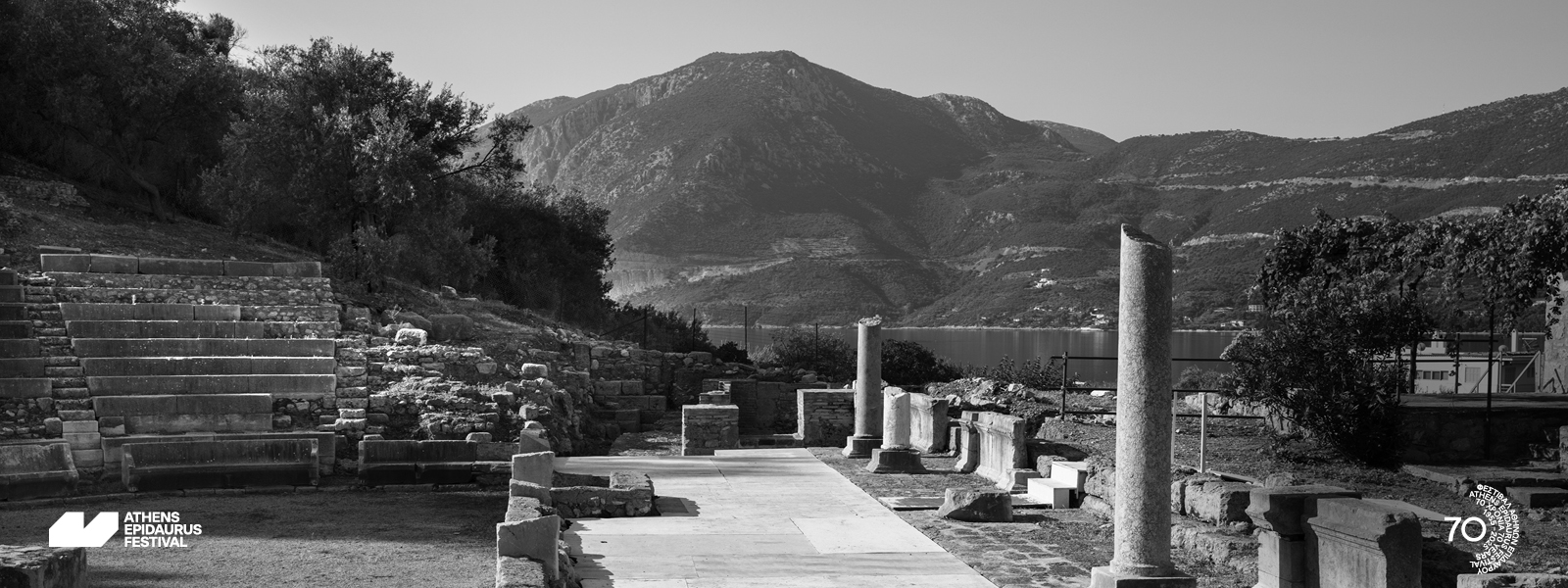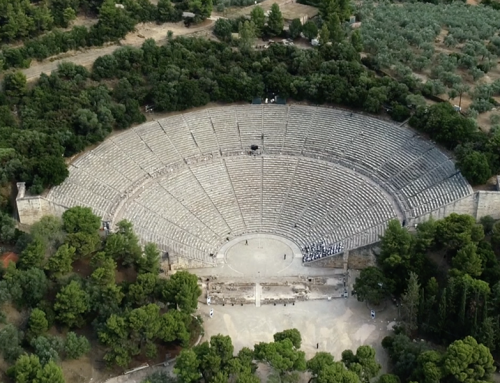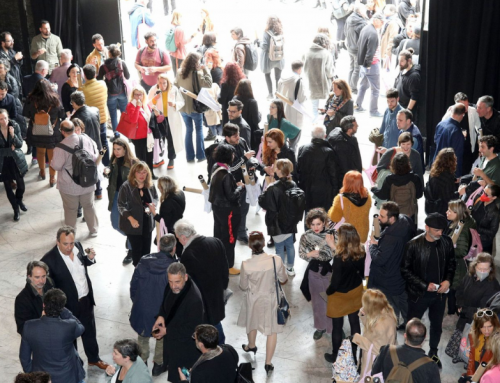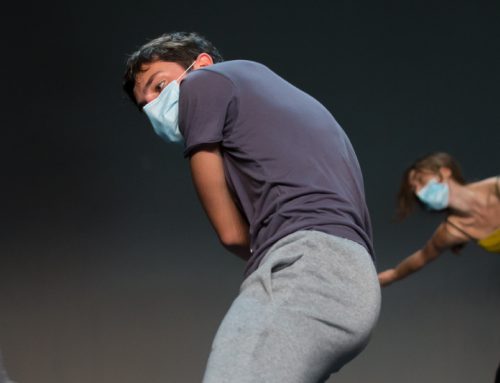From June 15 to August 30, 2025
STUDIO RESIDENCY
June 15 – 28
Parodos
Parodos, the interdisciplinary research programme (studio residency) launched in 2021, seeks to grant artists from a diverse artistic spectrum the opportunity to advance under ideal conditions their research on the dramaturgy of Ancient Drama in situ. The research process has a practical character and is developed in two stages: the first (research) takes place in Athens and the second (application) at the Little Theatre of Ancient Epidaurus. This year, director Dimitris Karantzas has been tasked with the general coordination and supervision of the programme.
As part of the International Network of Ancient Drama
July 4 & 5
Olia Lazaridou
Thēbae Desertae
By Kiriakos Charitos
nspired by Sophocles’ Antigone

Now Thebes has the floor
These ruins you see
Are my scared walls
High temples and halls
Memory is nothing but language. In the long-forsaken countryside, a voice searches for a girl once called Antigone. The city awakens and begins to remember, shifting in and out of dreaming. Its pieces flicker with life and linger on fleetingly, only to turn to dust again.
Awarded writer and screenwriter Kiriakos Charitos (State Award for Children’s Literature 2023) forges a folk fable inspired by the myth of Antigone, directed by Olia Lazaridou. Eschewing the linearity of a work that the audience knows by heart, Thēbae Desertae manages to move both forward and backward, possessing the form of a murmur and the shape of a song.
Oscillating between verse and prose, the narration remains in close rapport with the music performed live on stage. Actors and musicians assemble a dreamlike band that at times speaks, sings, or chants, transporting us to a land strewn with fragments of memory, like other burial offerings. The performance is conceptually linked with the inaugurating Festival production at Epidaurus (Sophocles’ Antigone, directed by Ulrich Rasche).
Direction Olia Lazaridou • Music composition Jan Van Angelopoulos • Set & costume design Angelos Mendis • Lighting design Eliza Alexandropoulou • Movement Nikoleta Xenariou • Vocal coaching Giannis Psalidakos • Assistant to the director Ariadni Konstantakopoulou • Sound engineering Nikos Kollias • Cast Alexandra Kazazou, Olia Lazaridou, Giannis Psallidakos, Vasilis Tryfoultsanis Executive producer Apparat Athen / Nikolas Hanakoulas
July 11 & 12
Christos Stergioglou – Alexandros Drakos Ktistakis
Cries
What music lies inside “the thought of the refugee, the thought of the prisoner, the thought of the man reduced to merchandise,” as the poet Giorgos Seferis wrote in The Last Stop, the wailing of Hecuba, soon to become a slave after the fall of Troy in Euripides’ The Trojan Women, or the woes of people who have experienced slavery throughout their lives?
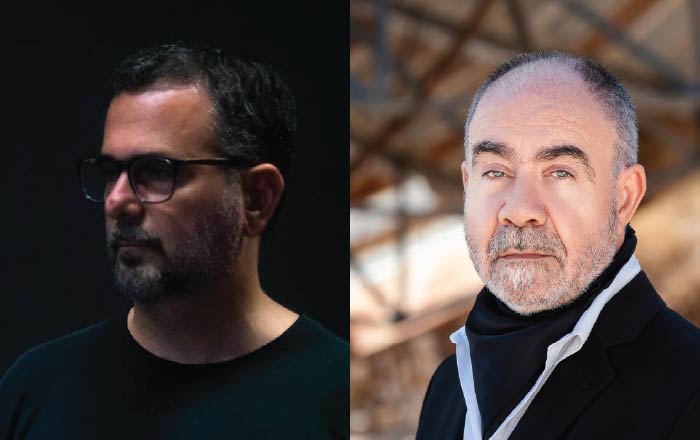
Questions like these served as a guiding light in an intricate research process that sought to lead ancient and modern poetry, as well as music, to new, uncharted territory. In the process, a unified musical work was born, one that addresses timeless and universal human concerns.
Centred around the notions of slavery, uprooting, and immigration throughout time, Cries is a performance that attends to the intersection and organic bond between poetry, Ancient Drama, melos (melody), and music.
Fragments of ancient tragedies, verses from demotic, modern Greek, and world poetry, as well as original texts, are fused into an original music score that bears the signature of Alexandros Drakos Ktistakis. The work is performed by the Alex Drakos Quartet, engaging in a vivid musical dialogue on stage with charismatic performers such as Christos Stergioglou—director of the performance, among others—and baritone opera singer Georgios Iatrou.
Direction Christos Stergioglou • Dramaturgy Taxiarchis Deligiannis, Vasilis Tsiouvaras • Music composition Alexandros Drakos Ktistakis • Performers Christos Stergioglou performance, vocals, Giorgos Iatrou vocals • On-stage musicians Alexandros Drakos Ktistakis drums, Giorgos Georgiadis bass, Yiannis Papadopoulos piano, Dimitris Tsakas saxophone • Dramaturgy consultant Eleni Spetsioti • Movement supervision Zoe Chatziantoniou • Set & costume design Ioanna Tsami • Lighting design Eliza Alexandropoulou • Sound engineering Nikos Kollias • Assistants to the director Taxiarchis Deligiannis, Vasilis Tsiouvaras • Executive producer Apparat Athen / Nikolas Chanakoulas
Duration 65′
July 18
Hellenic Film Academy – Athens Epidaurus Festival
Electra 7
A film inspired by Sophocles’ Electra
Another unexpected partnership on the occasion of the Athens Epidaurus Festival’s seventy-year celebration takes centre stage!
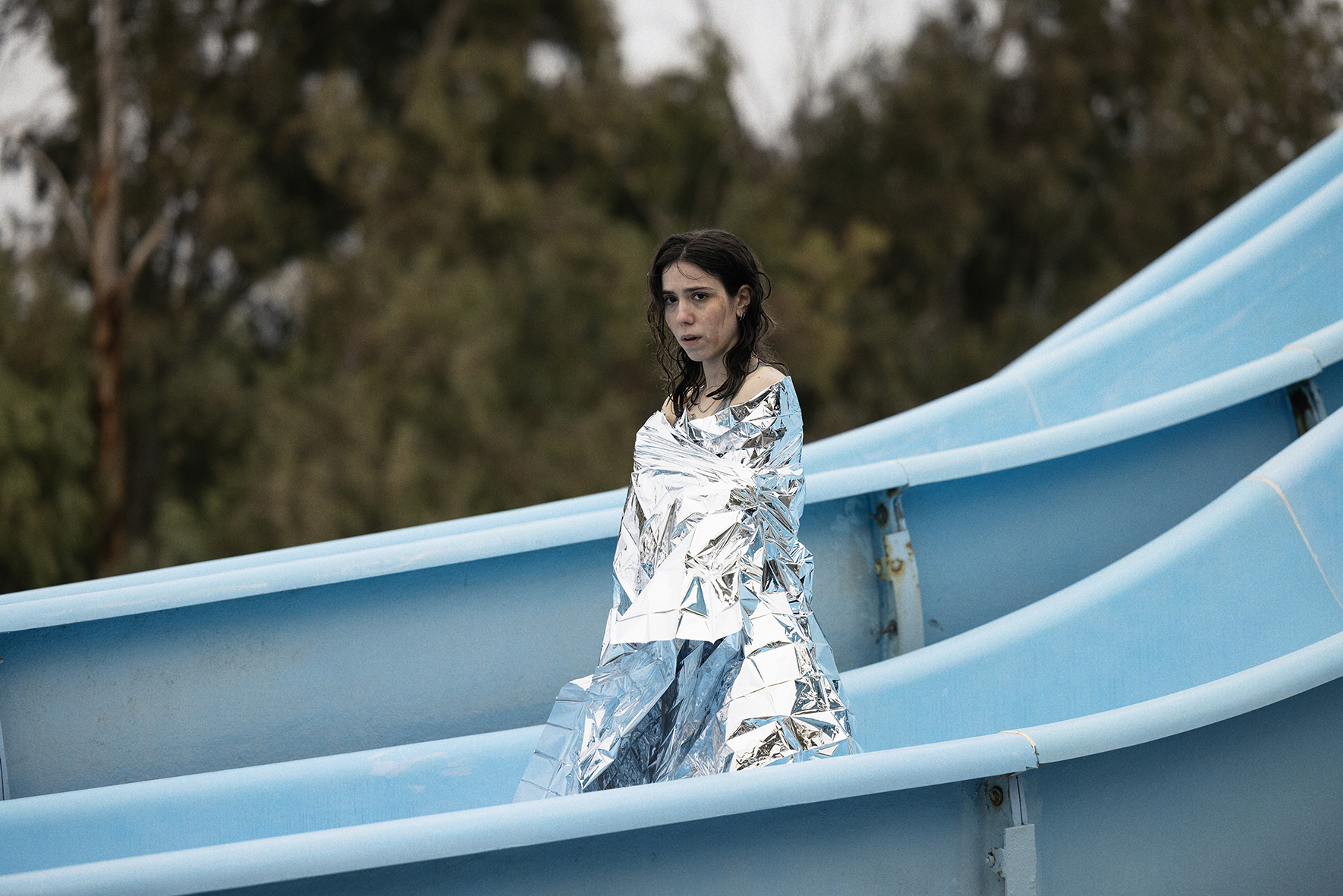
This time, the Festival joins forces with the Hellenic Film Academy to produce a film proposed by the Hellenic Film Academy, drawing its inspiration from Sophocles’ Electra. Part of the fruitful Contemporary Ancients cycle that now spreads its wings to the realm of cinema, the film, scripted by Panayotis Christopoulos, will consist of seven chapters, each one directed by a different filmmaker.
Seven distinguished film auteurs, both women and men, with a track history in Greek and international film festivals, were selected to represent the wide spectrum of contemporary Greek filmmaking and contribute to this imaginative filmic relay through their unique perspectives. These are in alphabetical order: Sofia Exarchou, Christina Ioakeimidi, Babis Makridis, Argyris Papadimitropoulos, Elina Psykou, Alexander Voulgaris, and Neritan Zinxhiria. Executive producer duties are helmed by producer Mina Dreki on behalf of Marni Films. All filmmakers will collaborate with different directors of photography and editors, while they will share a common team of contributors and actors.
Screenwriter’s note
Structured around a hypothetical matricide in present-day Greece, the film draws motifs and its thematic thread from Sophocles’ Electra to propose a narrative in seven parts—each offering a distinct perspective on the crime. Contrary to Sophocles tragedy, here the myth’s main figures speak a little or retreat in absolute silence. Their voices will instead be substituted by the Media, the Authorities, society at large, and their digital traces, with the quest for truth and its reconstruction ultimately proving unattainable.
Panayotis Christopoulos
Direction Sofia Exarchou, Christina Ioakeimidi, Babis Makridis, Argyris Papadimitropoulos, Elina Psykou, Alexander Voulgaris, Neritan Zinxhiria • Screenplay Panayotis Christopoulos • Cinematography Christos Karamanis, Nikos Karanikolas, Dimitris Lambridis, Simos Sarketzis, Manu Tilinski • Casting director Sofia Dimopoulou • Costume design Marli Aliferi, Elisavet Zacharaki • Set design Stavros Liokalos • Makeup Ioanna Lygizou • Sound engineer Stefanos Efthymiou • Cast Angeliki Papathemeli Clytemnestra, Kostas Koronaios Agamemnon, Avgoustis Koumoulos Aegisthus, Maria Filini CJEU Officer, Elsa Lekakou Electra, Stefanos Kaltzidis Orestes, Katerina Zisoudi Chrysothemis, Nikos Hanakoulas Guard, Maria Kallimani Woman, Filippos Salatas Baby Chrysothemis, Thanos Alexiou Member of Parliament, Laertis Malkotsis Pedagogue, Danae Deligeorgi Child Psychologist, Evgenia Samara TV Host, Giorgos Kouvaras Reporter, Ioanna Rampaouni Police Officer Electra, Serafeim Radis Police Officer Orestes, Vasilis Dimitroulias Forensic Expert • Executive producer Mina Dreki | Marni Films
The film is a production of the Athens Epidaurus Festival, in collaboration with the Hellenic Film Academy, and is being realised with the generous sponsorship of DEI.
DEI, the largest energy company in Southeastern Europe, supports everyone and everything that paves the way for a future brimming with culture. It fosters cultural production and highlights all forms of creative expression as a vehicle for social awareness and change.
July 25 & 26
On the right side of the streambed
by Giannis Palavos
Inspired by Sophocles’ Oedipus at Colonus
War session
By Aris Alexandris
Inspired by Aristophanes’ Lysistrata
Once again, Contemporary Ancients cycle introduces us to two female monologues inspired by Ancient Drama while acquainting us with their creators, Greek authors Giannis Palavos and Aris Alexandris. Commissioned by the Festival, they both turn to the well of ancient myths for guidance and succeed in unearthing their contemporary dimensions through a pair of imaginative and thought-provoking plays.

Author of the short-story collections The Joke (State Prize for Short Story 2013) and The Child, Giannis Palavos relies on Oedipus at Colonus to cast a new light on the archetypal father-daughter relationship. Through the monologue of a woman who traces the life of her father—a wandering folklore musician in the Greek countryside—the play paints the portrait of a man persecuted and outcast, much like his mythical counterpart, with his daughter as his sole refuge. Having just released his second book, Tria epi Psychis (2024), Aris Alexandris (winner of the State Prize for a Promising Author 2023 for his novel How Ignatius Karathodoris lost everything), on his part, revisits Lysistrata to offer a hilarious monologue on the decline of sex in the digital age, reframing it as an unprecedented and peculiar war—one fought on the battlefield of the human body.
On the right side of the streambed
In Giannis Palavos’ On the right side of the streambed, a work loosely woven around Sophocles’ Oedipus at Colonus, the story of two figures, a father and a daughter, unfolds. The father—a folklore musician who, on the strength of his art, untangles the riddles of others yet remains blind to his own—is wandering ousted and helpless, with his daughter as his only anchor. A year after his death, she holds an informal memorial in his honour, recounting the pieces of his personality while also casting a bitter yet tender look upon their relationship.
War session
Can abstinence from sex bring war to a halt? Aris Alexandris’ Lysistrata is a frustrated psychologist who is fed up with listening to her patients whining about the shortcomings behind their relationships and choices. Convinced that we are in the midst of a peculiar war—with the human body as its battlefield—she sets up an online group therapy session to share with the participants her most critical advice: complete sexual abstinence. In an era of sexual overexposure, what place does it truly occupy in the lives of people? A hilarious monologue in which determination collides with doubt and traditional notions of love strike a conversation with the thorny realities of the digital age.



